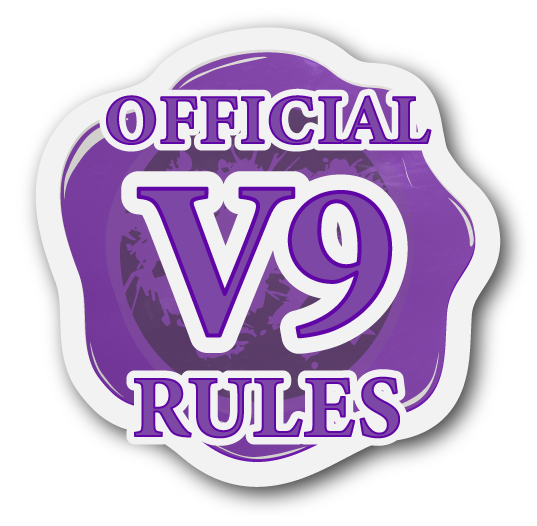Difference between revisions of "V9: Battlefield Etiquette"
From AmtWiki
m (Protected "V9: Combat Etiquette" ([Edit=Allow only administrators] (indefinite) [Move=Allow only administrators] (indefinite))) |
m (removed extra line breaks) |
||
| (16 intermediate revisions by 3 users not shown) | |||
| Line 1: | Line 1: | ||
| − | + | {{V9}} | |
| − | === | + | <onlyinclude>===<u>[[V9: Battlefield Etiquette| Battlefield Etiquette]]</u>=== |
| − | Everyone processes the game differently so it is important to communicate early and often with your opponents. | + | Everyone processes the game differently so it is important to communicate early and often with your opponents. Keep the [[V9: Honor System| Honor System]] in mind as you work with your opponent to execute the game rules as best as you can. |
| − | + | <ol> | |
| − | # | + | <li>'''If you have to think about it, take it.''' If you are unsure whether an opponent’s [[V9: Striking Your Opponent#Valid Strike|strike]] or [[V9: Abilities and Effects|ability]] against you was valid, give them the benefit of the doubt and take it. Only attacks which are clearly invalid should be treated as such, and in those cases it is common courtesy to announce to your opponent the reason you believe it to be so. </li> |
| − | + | <li>'''It is the responsibility of the victim of an attack to determine the [[V9: Hit Location|location]] of strikes against them.''' If the victim is unsure or didn't realize they were struck, the attacker may clarify and call out what they believe happened. If the attacker is unavailable, such as in the case of a run-by or long-range [[V9: Projectiles|projectile]], then the victim should take whatever they believe is most likely to have occurred.</li> | |
| − | + | <li>'''As long as you and your opponent(s) agree on the outcome, the exact details of any encounter are moot.''' It's okay to be [[V9: Honor System#HSR4|slightly inaccurate]] if the alternative is wasting time in the middle of battle trying to sort out fine details.</li> | |
| − | + | <li>'''Do not call the results of other engagements''' unless the players involved are asking for your opinion.</li> | |
| − | + | <li>'''If you notice a player is repeatedly ignoring strikes or [[V9: Abilities and Effects|effects]] that you believe are connecting''', ask them about it [[V9: Honor System#HSR3|politely]] in the form of a question ("Did that connect?" "Where did that land?" "Was that hand or arm?"). If the behavior continues, bring the issue to the attention of a [[V9: Reeve| Reeve]] and they will seek to resolve it. Do not confront the player directly again after this point, even if you believe you have a good rapport with them. Allegations of misconduct are often better received when filtered through the [[V9: Rules Authorities| proper channels]] and handled with care.</li></ol></onlyinclude><br> | |
| − | + | {{V9 Striking Your Opponent}} | |
| − | |||
Latest revision as of 03:38, 13 January 2024
This page is part of the Official Amtgard V9 Alpha-Playtest Rulebook.
- The Amtwiki is the official home and primary source for Amtgard V9 Rules as of February 25, 2023.
- These rules are currently in Open Alpha Playtest. See the Playtest Disclaimer for more details.
- To learn more about Amtgard V9 Development, please visit Amtgard.com.
- To view the current Amtgard V8 ruleset, please see the Amtgard V8 Rulebook.
Battlefield Etiquette
Everyone processes the game differently so it is important to communicate early and often with your opponents. Keep the Honor System in mind as you work with your opponent to execute the game rules as best as you can.
- If you have to think about it, take it. If you are unsure whether an opponent’s strike or ability against you was valid, give them the benefit of the doubt and take it. Only attacks which are clearly invalid should be treated as such, and in those cases it is common courtesy to announce to your opponent the reason you believe it to be so.
- It is the responsibility of the victim of an attack to determine the location of strikes against them. If the victim is unsure or didn't realize they were struck, the attacker may clarify and call out what they believe happened. If the attacker is unavailable, such as in the case of a run-by or long-range projectile, then the victim should take whatever they believe is most likely to have occurred.
- As long as you and your opponent(s) agree on the outcome, the exact details of any encounter are moot. It's okay to be slightly inaccurate if the alternative is wasting time in the middle of battle trying to sort out fine details.
- Do not call the results of other engagements unless the players involved are asking for your opinion.
- If you notice a player is repeatedly ignoring strikes or effects that you believe are connecting, ask them about it politely in the form of a question ("Did that connect?" "Where did that land?" "Was that hand or arm?"). If the behavior continues, bring the issue to the attention of a Reeve and they will seek to resolve it. Do not confront the player directly again after this point, even if you believe you have a good rapport with them. Allegations of misconduct are often better received when filtered through the proper channels and handled with care.
Striking Your Opponent Invalid Obstructions · Friendly Fire · Multiple Points of Contact · Shot in Motion · Battlefield Etiquette
Core Combat Rules Acceptable Contact · Hit Locations · Striking Your Opponent · Wounds · Death · Dragging
